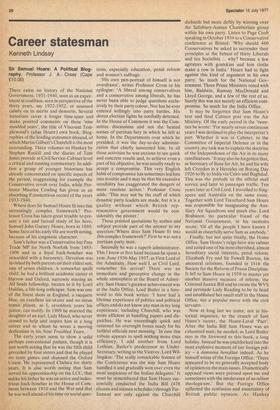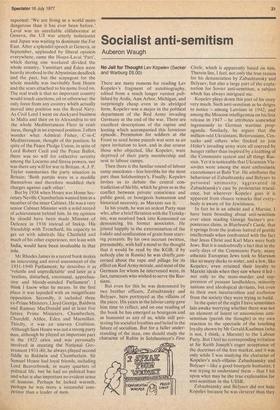Career statesman
Kenneth Lindsay
Sir Samuel Hoare: A Political Biography. Professor J. A.• Cross (Cape £10.00) There exists no history of the National Govern inent, 1931-1940, seen as an experiment in coalition, seen in perspective of the thirty years, say 1922-1952, or assessed calmly on its merits and demerits. Several historians cover a longer time-span and make pointed comments on these 'nine troubled years', the title of Viscount Ternplewood's (alias Hoare) own book. Biographies of the leading statesmen abound, of which Martin Gilbert's Churchill is the most outstanding. Three volumes on Hankey by Stephen Roskill and the diaries of Tam Jones provide at Civil Service-Cabinet level a critical and running commentary. In addition a group of younger historians has already concentrated on specific aspects of the period, reappraising for example the Conservative revolt over India, while Professor Maurice Cowling has given us an absorbing if contentious record of the years 1933-1940.
Where does Sir Samuel Hoare fit into this increasingly complex framework? Professor Cross has taken great trouble to present a fair and factual study of his hero, Samuel John Gurney Hoare, born in 1880. Some facts of his early life are worth noting, because of his enigmatic character.
Sam's father was a Conservative but Free Trade MP for North Norfolk from 18851906 and as a loyal back-bencher was rewarded with a baronetcy. Devotion was lavished by both parents on their eldest son, one of seven children. A somewhat spoilt child, he had a brilliant academic career at Harrow and Oxford,' narrowly missing an All Souls fellowship, beaten to it by Lord Halifax, a life-long colleague. Sam was one of the finest shots in England, a racquets blue, an excellent ice-skater and no mean tennis player, as I, seventeen years his junior, can testify. In 1909 he married the daughter of an earl, Lady Maud, who never ceased to help and inspire him in a long career and to whom he wrote a moving dedication in his Nine Troubled, Years.
The early years seem to show a solid perhaps conventional pattern, though it is just worth noting that he was the fifth child preceded by four sisters and that he played no team games and shunned the Oxford Union. He represented Chelsea for thirty years. It is also worth noting that Sam served his apprenticeship on the LCC, that unlike his father he was an active and industrious back-bencher in the House of Com7 mons between 1910 and the War and that he was well ahead of his time on social ques
tions, especially education, penal reform and women's suffrage.
'His own pen-portrait of himself is not overdrawn', writes Professor Cross in his epilogue: 'A liberal among conservatives and a conservative among liberals, he has never been able to judge questions exclusively by their party colour. Nor has he ever entered willingly into party battles. His dozen electiOn fights he cordially detested. In the House of Commons it was the Committee discussions and not the 'heated scenes of partisan fury in which he felt at home. In the Departments over which he presided, it was the day-to-day administration that chiefly interested him. In all these activities he was anxious to see quick and concrete results and, to achieve even a part of his objective, he was usually ready to accept a compromise. This very English habit of compromise has sometimes led him into trouble and it may be that his excessive sensibility has exaggerated the dangers of more resolute action.' Professor Cross adds: 'This may not be the stuff of which dynamic party leaders are made, but it is a quality without which British representative government would be considerably the poorer.'
These pointed quotations by author and subject provide part of the answer to my question:Where does Sam Hoare fit into this complex framework?' First he was nOt a partisan party man.
Secondly he was a superb administrator. This I know at first hand because he spent a year, June 1936-May 1937, as First Lord of the Admiralty. How well 1, as Civil Lord, remember his arrival! There was an immediate and perceptive change in the whole atmosphere at the Board of Admiralty. Sam Hoare's greatest achievement was at the India Office. Lord Butler in a foreword to this book writes: 'I have had a lifetime experience of politics and political offices and do not know any man in my long experience, including Churchill, who was more efficient at handling papers and dispatches. He was exceedingly quick and returned his overnight boxes ready for his faithful officials next morning.' In case this tribute appears to spell nothing more than efficiency, I add another from Lord Lothian, Butler's predecessor as UnderSecretary, writing to the Viceroy, Lord Willingdon: 'The really remarkable feature of the Conference was the way Sam Hoare handled it and gradually won over even the most suspicious of the Indian delegates.' It must be remembered that Sam Hoare successfully conducted the India Bill (478 clauses and sixteen schedules) through Parliament not only against the Churchill
diehards but more deftly by winning over the Salisbury-Austen Chamberlain group within his own party. Listen to Page Croft speaking in October 1934 to a Conservative conference at Bristol: 'Why should 460 Conservatives be asked to surrender their principles at. the behest of thirty Liberals and ten Socialists ... why? because a few agitators with goatskins and loin cloths make a row in India.' Hoare had to fight against this kind of argument in his own party. So much for the. National Government. Three Prime Ministers voted with him, Baldwin, Ramsay MacDonald and Lloyd George, and a few of the rest of us. Surely this was not merely an efficient compromise. So much for the India Office.
It may be forgotten that Sam Hoare's first and final Cabinet post was the Air Ministry. Of the early period in the 'twenties he wrote: 'For nearly seven continuous years I was destined to play the interpreter's part. Whether it was in Cabinet, in the Committee of Imperial Defence or in the country, my task was to explain the doctrine of the Independence of the Air in its many ramifications.' It mayalso be forgotten that, as Secretary of State for Air, he and his wife left Croydon in a Hercules on Boxing Day 1926 to fly to India via Cairo and Baghdad. This was the prelude to the official mail service and later to passenger traffic. Ten years later as Civil Lord, I travelled to Singapore and Australia on the same route. Together with Lord Trenchard Sam Hoare was responsible for inaugurating the Auxiliary Air Squadrons and much else. Lord Brabazon, no particular friend of the National Government, in his memoirs wrote: 'Of all the people I have known I would as cheerfully serve Sam as anybody.'
Finally, but not quite finally, the Home Office. Sam Hoare's reign here was calmer and suited one of his most cherished, almost hereditary social interests, penal reform. Elizabeth Fry and Sir Fowell Buxton, his ancestral relations, fOunded in 1816 the Society for the Reform of Prison Discipline. It fell to Sam Hoare in 1938 to master yet another massive measure of reform, the Criminal Justice Bill and to create the WVS and persuade Lady Reading to be its head and established her small staff in the Home Office, not a popular move with the civil servants.
Now at long, last we come, not in historical sequence, to the crunch of Sam Hoare's career, the Hoare-Laval 'Pact'. After the India Bill Sam Hoare was an exhausted man; he needed, as Lord Butler says in the foreword to this book, a long holiday. Instead he was pitchforked into the most explosive moment of our foreign policy — a damnosa hereditas indeed. As he himself wrote of the Foreign Office: 'There appeared to be no generally accepted body of opinion on the main issues. Diametrically opposed views were pressed upon me and sometimes with the intolerance of an odium theologicum.' But the Foreign Office reflected the confusion and uncertainty of British public opinion. As Hankey
reported: 'We are living in a world more dangerous than it has ever been before.', Laval was an unreliable collaborator at Geneva, the US was utterly isolationist and Japan was waiting to dominate the Far East. After a splendid speech at Geneva, in September, applauded by liberal opinion everywhere, came the Hoare-Laval 'Pact', which during one weekend divided the whole country. Vansittart and Eden were heavily involved in the Abyssinian deadlock and the pact, but the scapegoat for the whole muddle was inevitably Sam Hoare and the scars attached to his name lived on. The real truth is that no important country would touch sanctions, oil or otherwise: the only force from any country whin actually moved into position was the Royal Navy. As Civil Lord 1 went on dockyard business to Malta and then on to Alexandria to see the whole Mediterranean Fleet in readiness, though in an exposed position. I often wonder what Admiral Fisher, C-in-C Mediterranean, thought of the position. In spite of the Peace Pledge Union, in spite of Lord Robert Cecil and the Peace Ballot, there was no will for collective security among the Locarno and Stresa powers, not was there any will for war in Britain. A. J. P. Taylor summarises the party situation in Britain : 'Both parties were in a muddle themselves and therefore muddled their charges against each other'.
But by 1938 when Hoare was Home Secretary Neville Chamberlain wanted him as a member of the inner Cabinet. He was a very senior Cabinet Minister with a solid record of achievement behind him. In my opinion he should have been made Minister of Defence in 1936 instead of Inskip. His friendship with Trenchard, his capacity to get on with admirals like Chatfield and much of his other experience, not least with India, would have been invaluable in that role.
Mr Rhodes James in a recent book makes an interesting and novel assessment of the 1931-1940 Parliament; he describes it as 'volatile and unpredictable' and later as a 'restless, disturbed, emotional, apprehensive and bloody-minded Parliament'. I think I know what he means. In the first place it was lopsided with an insignificant opposition. Secondly, it included three ex-Prime Ministers, Lloyd George, Baldwin and Ramsay MacDonald and at least five future Prime Ministers, Chamberlain, Churchill, Attlee, Eden and Macmillan. Thirdly, it was an uneven Coalition. Although Sam Hoare was not a strong party man, although he played an important part in the 1922 crisis and was personally involved in creating the National Government 1931-40, he always played second fiddle to Baldwin and Chamberlain. Sir Samuel Hoare had loyal friends, including Lord Beaverbrook, in many quarters of political life, but he had no political base and what is also important no evident sense of humour. Perhaps he lacked warmth, perhaps he was more a successful competitor than a leader of men.



































 Previous page
Previous page